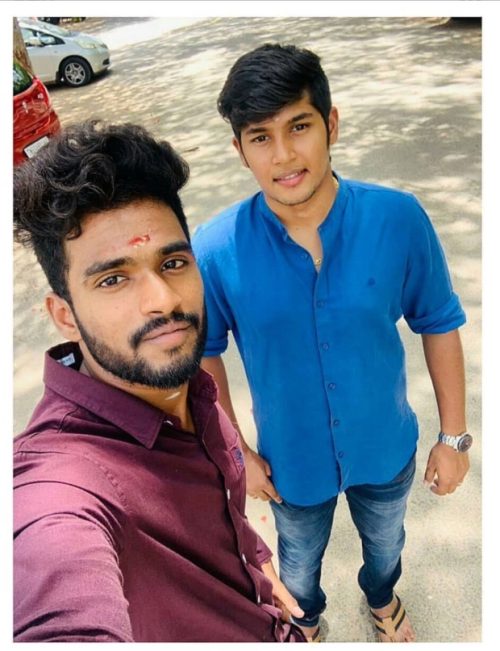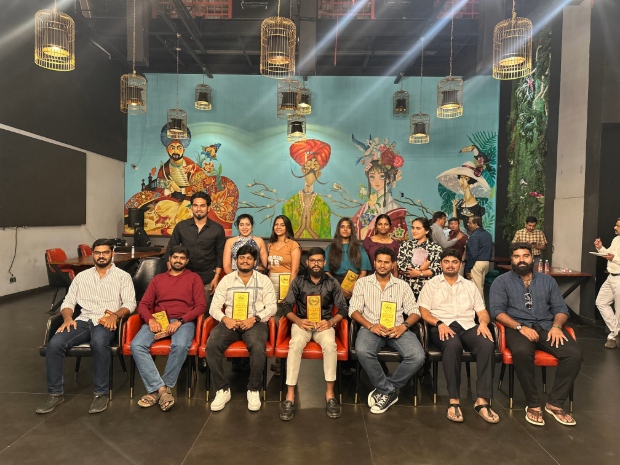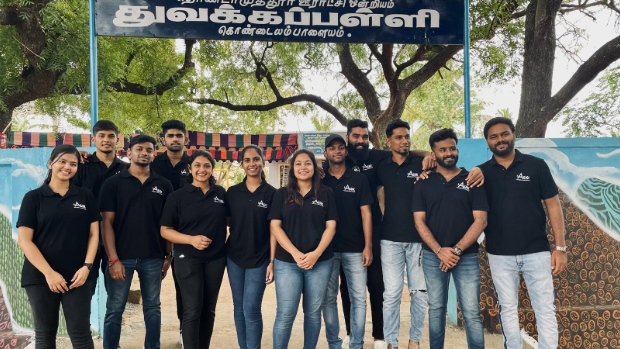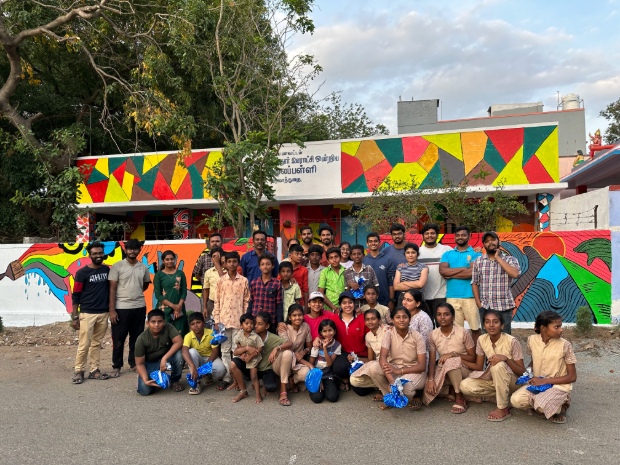For students at a small government school in Kondayampalayam, their classrooms greeted them with alcohol bottles and cigarette butts every morning. In the evenings, this school would find itself occupied by men drinking and smoking.
The reason? A lack of respect for the school within the community and inadequate infrastructure that facilitated easy access for those seeking a secluded space.
“The bottles and matchsticks were ruining the schools’ reputation and the learning mentality,” shares Mohammad, who is heading ‘Aram Seiya Karam Koduppom’ (ASKK), whose intervention transformed the school to help restore its sanctity.
Founded by Prthush and Kaali in 2018, ASKK has made it a mission to ensure every school has the requisite infrastructure deemed necessary for quality learning.
From tragedy to purpose
Prthush’s journey towards social service began with a personal tragedy in 2017. “It was 21 April, the day I turned 18. That same day, I lost my best friend,” he recalls.
To cope up with the grief and void, he turned to social work. “Visiting orphanages and engaging in social work was personally of huge help and relief,” he says.
Kaali was Prthush’s college mate at the Sri Krishna College of Engineering and Technology in Coimbatore, and had been driven by a similar passion to help those in need.

Originally from Madurai, Kaali would spend his pocket money distributing food to people in and around his locality every weekend.
“When we met and spoke, we liked each other’s mindset, positive attitude and the common agenda to serve the people,” shares Prthush.
This quickly forged a strong bond. Recognising the potential of their collective efforts, they decided to formalise their endeavours.
“When 10 people can do so many, how much can 100 people do?” Prthush says. In 2019, the two friends decided to formally register their organisation.
Lending hands
The initial aim was to establish zero hunger for the homeless. During the COVID lockdown, they provided over 50,000 people with food and supplied essential kits to over 2,000 families. Apart from migrant workers, they also distributed refreshments to police officials, who were tackling the crisis from the frontlines.
Prthush and Mohammad soon realised that food drives were not addressing the root of societal challenges. “There were other organisations involved in food drives as well and by the time it’s 2 pm, a person at a bus stop would have received five or six food packets. He might be able to eat two, while the rest goes to waste,” reflects Mohammad.

Determined to make a more lasting impact, the team shifted focus to education and self-development initiatives. “We chose the outskirts of Coimbatore where there were tribal and low income families in absolute need of help and guidance,” Prthush says.
“We wanted to empower individuals and organisations to sustain their own growth in the long run,” Mohammad adds. The team focused their energy into improving educational infrastructure in remote schools across the Coimbatore region.
Providing a safe space to learn
“Initially, when we considered taking up a school project, we had no experience at all. We located schools that are in remote locations, and are in desperate need of renovation,” shares Mohammad.
The NGO prioritises not only renovating schools’ infrastructure, encompassing roof repairs, compound wall construction, and toilet fixes, but also fostering an understanding of the importance of studying in a well-equipped and vibrant environment, through artistic touches that create a lively atmosphere.
Their efforts have already revitalised seven schools located in areas such as Somanur, Kondayampalayam, Madhampatti, and Annur, in and around Coimbatore.
“We primarily identify schools through word-of-mouth recommendations, but we also conduct thorough research to ensure we prioritise those with the greatest need,” shares Mohammad.

The school in Kondyampalayam was their first project, and with the right approach they were able to stop people from entering the premises illegally.
“The compound wall was broken, the roof was on the verge of collapsing, and there were no basic amenities,” recalls M Mangayarkarasi, who has been teaching at the school since 2013. “From the outside, there was no sign that a school existed here. That was the condition.”
For years, efforts to secure funds yielded little, and the school seemed destined for closure. “As a final resort, our headmaster has informed the counsellor Vellingiri, who told the NGO about us,” says Mangayarkarasi. In 2022, ASKK stepped in.
Creating a school every child deserves
What followed was nothing short of a transformation. “Over the summer vacation, the youngsters repaired the compound wall, constructed a storeroom, installed a water tank, and revamped the washrooms,” says Mangayarkarasi.
They ensured every classroom was structurally sound and visually appealing, painting the walls with vibrant murals that created a lively and inviting atmosphere.
The renovations also addressed societal barriers, such as caste-based stigma, as the school’s new facilities and ambience began drawing attention from all community sections.
“Parents who previously preferred private schools are considering enrolling their children here,” Mangayarkarasi says. “The students’ enthusiasm has significantly improved, and they look forward to coming to school.”
Beyond infrastructure, ASKK ensures a holistic approach by providing first-aid kits, laptops, and sports equipment. The team set up a volleyball net in a school to encourage physical activities and sports among students.
They also maintain regular contact with the schools post-renovation, gathering feedback, making case studies, and celebrating occasions like Children’s Day and team members’ birthdays with the students. These gestures foster a strong bond between the organisation and the schools, creating a chain reaction of positivity.
“The children get very excited when their team comes here. They are thankful for studying in a safe and equipped environment,” shares Mangayarkarasi.
Building dreams, one thought at a time
Today, ASKK is a dynamic team of 20-25 individuals, including open volunteers, who dedicate their time and skills to school renovation projects, balancing it with their corporate jobs.
Prthush, who is pursuing his masters in the USA, manages the NGO remotely. “It becomes a little tricky as I am half a day behind. But I can trust my team blindly and they have been doing a good job,” he says.

The team’s approach is methodical and deeply rooted in community engagement. Before beginning any project, they conduct thorough research and consult with principals and teachers to identify the school’s specific needs. By addressing these needs comprehensively, ASKK ensures that its efforts lead to long-term benefits rather than temporary fixes.
While the outcome is undeniably positive, the journey has not been without challenges. Funding for ASKK’s initiatives primarily comes from friends and family, with the founders’ parents providing unwavering support. “We never think about profits,” says Mohammad. “The satisfaction of creating change in the community keeps us going.”
“Our goal is to create a safe and stimulating environment that encourages students to stay in school and pursue their education enthusiastically,” explains Mohammad. “We’ve seen how a positive atmosphere can make a significant difference in a child’s motivation to learn, and we will continue to do so in whatever capacity we can.”
Edited by Arunava Banerjee; All images courtesy ASKK
No comments:
Post a Comment